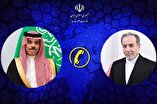
Imam Khamenei, the Leader of the Islamic Revolution, met with Iran’s officials in charge of conducting and organizing Hajj pilgrimage in the Imam Khomeini Hussainiyah on Sunday, May 4, 2025.

The spokesman for the National Security and Foreign Policy Committee of the Islamic Consultative Assembly said: "In addition to having special weapons to counter the threats of the Zionist regime, the Islamic Republic of Iran also has complete control over vital points and sensitive centers of the occupied territories."

"We are more determined to reach a just and balanced agreement," said Iran's foreign minister, referring to the postponement of the fourth round of indirect negotiations with the United States.

Ali-Akbar Ahmadian, Secretary of Iran’s Supreme National Security Council (SNSC), emphasized that Iran will not relinquish its inalienable right to the peaceful use of nuclear energy, stressing that nuclear weapons have no place in the country’s defense doctrine.

The Foreign Ministry spokesman warned of the consequences of contradictory behavior and provocative positions of the United States.

In response to Netanyahu's boasting, Iran's Foreign Minister emphasized that Iran is strong enough and confident in its capabilities, and any attack will be responded to immediately in the same way.

Seyed Abbas Araqchi and Faisal bin Farhan discussed bilateral relations and regional and international developments in a telephone call.

In his speech at the Carnegie Conference, Iran's Foreign Minister emphasized that the subject of negotiations should be solely the lifting of sanctions and the Iranian nuclear issue, saying: "Iran will never compromise its security."

Arms sanctions enabled the Islamic Republic of Iran to stand on its own feet and, by achieving self-sufficiency, produce the most advanced military equipment in heterogeneous warfare.

Imam Khamenei, the Leader of the Islamic Revolution, met with senior officials from the executive, legislative, and judiciary branches of the government on April 15, 2025.









